
Exeter Stories
Exeter folk and friends in their own words - │ << Previous story │ Next story >> │
Letters home by CPO Alfred Whitehall, former POW from HMS Exeter
This is not a memory, but a letter from Chief Petty Officer Alfred Whitehall who was taken with 713 comrades as a POW by the Japanese after HMS Exeter was sunk on 1st March 1942.
Gordon Barnes discovered the letter and photo when researching his family history. He wrote:
I have been researching my family tree and have come across a member of the family who served on HMS Exeter during her sinking in the Java sea in 1942. His name was Alfred Whitehall. I have sent you a copy of his photo and service no, with a copy of the three page letter that he sent his sister from Manila camp, whilst he was waiting to be returned home. He was also in the Nagasaki camp and saw the atomic bomb that was dropped.
Alfred Whitehall, who had the rank of ERA4C, says in the letter, written in October 1945 from Manila, that he would like to stay in the Navy after he returns to England. He then mentions the dropping of the atomic bomb, followed by the condition of the prisoners.
6-10-45
Dear Edith,
I received your letter and I was glad to see that things are fine with you all, I am still a long way from home yet, as I am in a camp at Manila waiting for transport, I have been here for ten days and am fed up with waiting as I want to be at sea again on my way home.You know Edith I realy love the sea and if it is alright with Irene I hope to stay in the Navy as it is a fine life with good men, and my job is tops, don't mention this to Irene as I want to talk it over with her myself then if she wants me to stay home I will do so.
So you had another baby well I was glad to hear it, but I was sorry to hear about the spot of trouble that Bertha had but I expect she has got over it by now, I expect to hear more about it when I get home infact you will probably have quite a lot to tell me about as there must have been a lot happening while I have been away, and I am looking forward to having a bit of luck for a change, talking about luck I did have some, as I was in a camp at Nagasaki and saw the Atomic Bomb explode, although I never want to see another one it was dam good to know that the boys were giving the Japs hell, and it was hell believe me but after seeing that we never expected to get out alive, although we would have liked to have seen all the Japs die we were realy glad when the war ended as we would never have lived through another winter with the food we were eating, and we looked like lengths of string with knots tied where our joints were we were so thin, anyway I am like my old self again, thanks to the Yanks as we have wonderful treatment from them since we have been free.
Anyway no more war it will be good to see the towns of England all lit up again and to taste good beer to say nothing of home cooking, it is going to be like starting life all over again.
Remember me to all at home and I send love to you and yours. Your Loving Brother Alf
In his book No Surrender, W E Johns described the conditions of the POWs. Seven hundred and fourteen men of HMS Exeter were taken as POWs by the Japanese to a camp at Macassar after the sinking in March 1942. In September 1942, a thousand prisoners, some of whom were from the Exeter, were transported from Macassar camp, in the Asama Maru, to work in the docks at Nagasaki, while some were sent to Yoshikuma, about forty miles from Nagasaki. They were employed as slave labour in the coal mines in day and night shifts.
Five weeks after the atomic bomb was dropped, an Australian recovery team arrived and they marched out of the camp with home-made colours flying and were taken by train to the dockside at Nagasaki, witnessing the devastation on the way. At the dock they were issued with new GI clothing, cigarettes, toilet gear, sweets and other luxuries. The Americans arranged for Alfred and his comrades to be transported home on naval ships, ensuring that the malnourished men had a controlled diet that their bodies could adapt to, before being introduced to richer food. Other Exeter POWs imprisoned on Macassar were shipped home via Sydney on civilian ships; many became ill because they were not accustomed to the rich food.
Footnote to the letters
Three years after I added this page, I received an email from Barrie, the son of Alfred Whitehall along with copies of telegrams and postcards from the POW camp he was held in. Alfred was not aware of the original letter from Nagasaki before it was found by a neighbour on the Exeter Memories page. Barry wrote of the documents:
I have scanned some of the telegrams and postcards that Mother received following father's capture and subsequent release. I hope you will be able to add some or all of this material to his page, it would give me great pleasure to see the story completed.
The initial telegram she received is dated 13th March 1942 and reports the loss of HMS Exeter (although not referred to by name) with the statement that Alfred Whitehall must therefore be regarded as missing on active service.
I know that she always insisted that he was alive but it was not until the 8th March 1943 that she received a telegram to say that he was a prisoner of war in Japanese hands.
I have 4 postcards that were sent from the POW camp. The first one is undated and states that at last he is able to write. One other is undated and the other 2 are dated 21st April 1944 and 5th October 1944.
Mother received a telegram in September 1945 stating that Alfred Whitehall has been recovered from Japanese hands, exact whereabouts not yet known. There is also a letter postmarked Australian Army 26th September 1945 in which he writes that he has that day left Okinawa by air and arrived in Manila safe and sound. He states that the next leg of the journey will be by ship and that he hopes it will not be many weeks before he is with Mother again.
I know that they were transported to Los Angeles, from there they traveled by train to San Fransisco and Vancouver before crossing Canada in a special train eventually arriving in New York. During that journey Canadians traveled to meet them at the various stations they passed through, some having journeyed over 200 miles to see them. Alfred finally made it back to Plymouth in early November 1945.
Whilst Father stated in his letter to his Sister Enid (Edith) that he wanted to remain in the Navy he did not and spent the rest of his life working in Plymouth. He died in 1976 and Mother passed away in 2006.
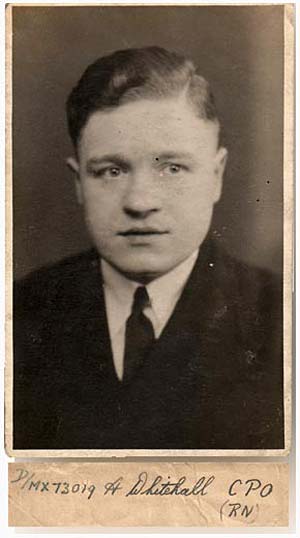
Click on an Image below to enlarge.
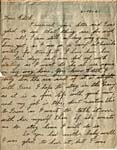
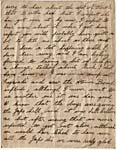 Page 1 of the letter
Page 1 of the letter
of the 6th October 1945
Page 2
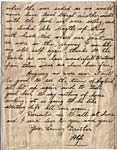
 Page 3
Page 3
Telegram of the
13th March 1942

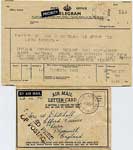 Telegram of the
Telegram of the
8th March 1943
Telegram of the
26th September 1945

 Postcard from the
Postcard from the
Japanese POW camp
at Fukuoka No. 2
Postcard from
Japanese POW camp
5th October 1944
│ Top of Page │